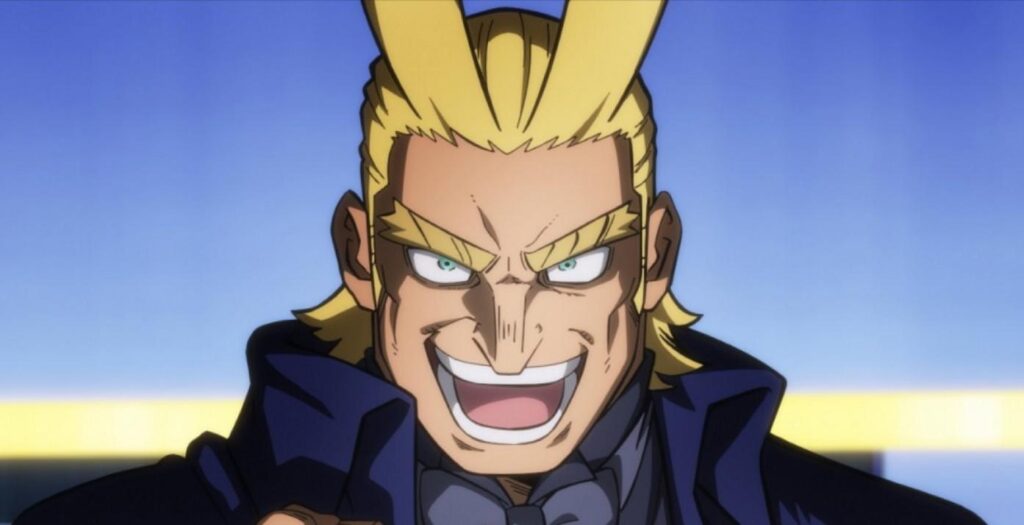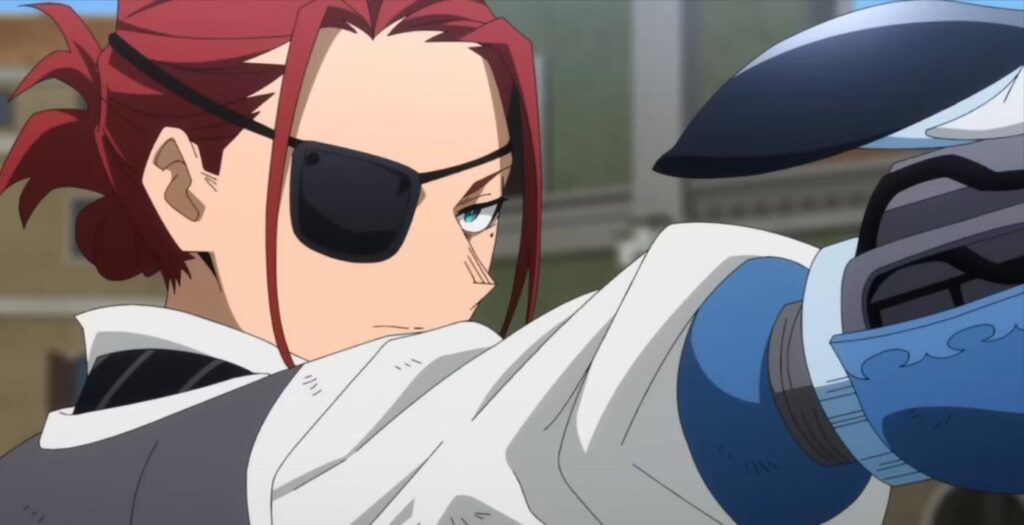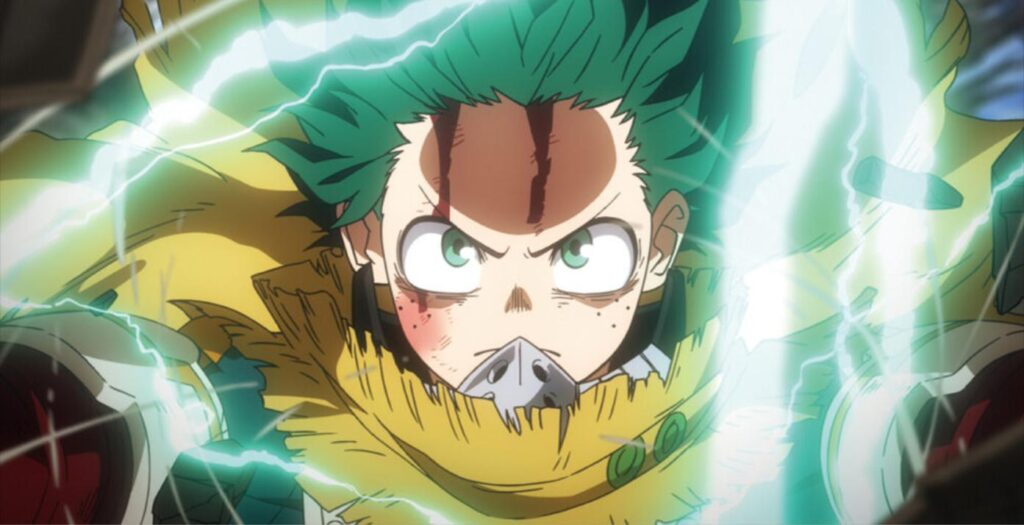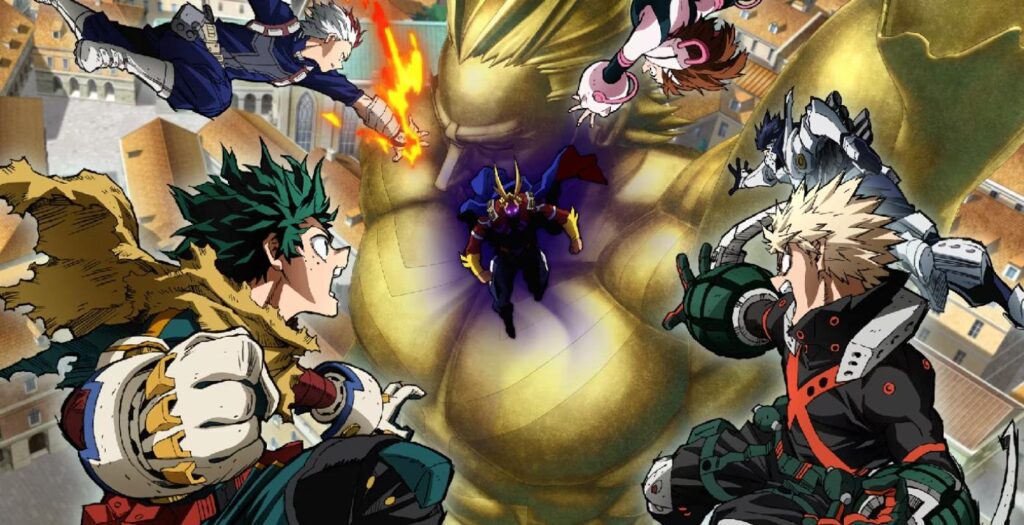The fourth original feature film for studio Bones‘ anime adaptation of Kohei Horikoshi’s manga, My Hero Academia You’re Next, tackles the question of legacy. The film is grounded in the last words that All Might, the Symbol of Peace, said before he retired after his battle with All For One, the Symbol of Evil: “Now, it’s your turn.”
Directed by Tensai Okamura and with an original screenplay by Yôsuke Kuroda, My Hero Academia You’re Next takes place after the events of Season 6 and before the start of Season 7. Japan is in shambles and villains are running dangerously through the streets. The series and other feature films establish that the students of U.A. High are set on continuing All Might’s legacy, especially Izuku Midoriya (Justin Briner/Daiki Yamashita), Katsuki Bakugo (Clifford Chapin/Nobuhiko Okamoto), and Shoto Todoroki (Yûki Kaji/David Matranga).
With Japan devastated by the all-out battle, a man claiming to be All Might (Christopher Sabat) emerges. After causing his own damage, the man presents himself as All Might and the next Symbol of Peace that Japan needs. Only he’s more Dark Might than All Might.
Despite looking like a copy of the UA mentor, Dark Might’s goals are selfish first as he grasps for power. His dedication to himself is made external through his quirk, which allows him to construct any of his desires, which he uses to encase the students who responded to the emergency and innocent civilians, too.
My Hero Academia You’re Next makes the characters address the future.

At the core of it all, though, is a crime family and a woman named Anna (Meru Nukumi/Kayli Mills), who is held hostage and used by the people around her. The stoic butler hot on her trail is Guilio (Mamoru Miyano/Mauricio Ortiz-Segura), with a connection that can be dangerous or life-saving. One of the film’s best elements is getting to the bottom of that.
My Hero Academia You’re Next has much strength to offer in the new original characters it introduces. Beyond that, the diversity of quirks we see on display that we haven’t seen before is absolutely fantastic. While nearly every canon character in the series exists as a secondary or tertiary character in the film, the way they interact with and prop up the narrative and new character is exceptionally well executed.
Chief among them are Giulio and Anna. Their connection to each other is heartbreaking as Giulio tries to save Anna from her captors. Giulio’s love for Anna comes through, and the tragedy in their circumstance is one of the most powerful elements of the film. In fact, they’re easily two of my favorite original characters that have appeared in the feature films.
The latest My Hero Academia feature film makes fans ask what’s next?

Whether it’s in fight sequences where they have to find out the rules behind new quirks they haven’t seen before, or when the students recall the impact All Might has had on them, it all works. With each core group of 1-A students and pro-heroes sectioned off into groups, the way each converges on Dark Might is as loud and poetic as the series can offer.
It’s also a reminder that the series is good at repeating. These heroes are still students. They’re still kids, and occasionally, they do still need adults to come in for support. This grounds the now large extended cast in a human quality that keeps it from going off the rails.
I’m not saying that My Hero Academia You’re Next is that deep. However, it poses a larger question opened up following the events of Season 6: what comes next? We’ve seen All Might and his heroism glorified for inspiration for our series protagonists with Deku and Bakugo, but we have also seen it morphed into hatred with villains like Stain.
The vacuum that All Might’s weakness leaves behind has been a central question since the end of My Hero Academia Season 4. The choice to make Dark Might a man who makes faux versions of the world for his own purposes elevates the idea that, ultimately, there is no All Might anymore. Dark Might may have altered his face to look like the former Number One hero, but it’s a shell.
My Hero Academia: You’re Next makes it clear that there is only one All Might.

If anything, My Hero Academia: You’re Next exists to promote the idea that there is no next All Might. There are just people doing good deeds and heroes dedicating their lives to bettering the world. As the students of Class 1-A assemble, the core message of the film is clear: They’re next, all of them.
The film’s finale focuses on the fact that Deku, Bakugo, and Todoroki are the future. They carry what All Might means to them into battle and, more importantly, their choices. They take back the mantle that Dark Might stole and leave it with hope, a stark difference from the Japan in ruins that we see at the film’s beginning.
Limiting All Might to the fringes of this story is also a choice that makes the final battle have all the more impact. Once you’re gone, you don’t get to choose how your legacy is remembered. You don’t get to control what people do in your name. But those you mentored and led have the power to take it back from those who would use it for wrong. Had All Might been included in the main parts of My Hero Academia You’re Next, this salient point wouldn’t have hit the film’s primary emotional high.
While My Hero Academia You’re Next doesn’t reach the emotional high of the shonen anime’s second feature film, My Hero Academia: Heroes Rising, it is a film with hope, and that’s what we need right now. The film’s commentary on legacy stands as its most impactful, and still, studio Bones’ action sequences hit an animation high that warrants seeing it on a big screen. My Hero Academia You’re Next shows why superhero fatigue has yet to set in for fans of Horikoshi’s characters.
My Hero Academia: You’re Next is streaming now, exclusively on Crunchyroll.
My Hero Academia: You're Next
-
Rating - 8/108/10
TL;DR
While My Hero Academia: You’re Next doesn’t reach the emotional high of the shonen anime’s second feature film, My Hero Academia: Heroes Rising, it is a film with hope, and that’s what we need right now.







